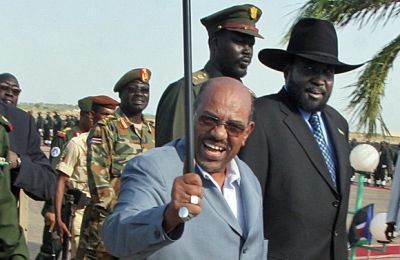South Sudan cabinet forms preparatory committee to receive Sudan president
November 2, 2012 (JUBA) – South Sudan has formed a high-level committee tasked with responsibilities to organize the visit to Juba of Sudanese President Omer Hassan Al-Bashir for the first time since South Sudan’s independence 17 months ago.

With the two sides coming to the brink of a return to all-out war the UN Security Council issued resolution 2046, warning both sides of non-military sanctions if they did not resolve the issues outstanding from South Sudan’s secession.
South Sudan’s Information Minister, Barnaba Marial Benjamin said Friday that the visit of Al-Bashir to Juba would mark a “new beginning and building trust to strengthen mutual cooperation” between the two states.
The committee to prepare for Bashir’s trip will compromise different groups to prepare for reception, according to the ministe.
However, Marial downplayed the calls, predominantly members of the civil society organizations and human rights activists who are opposed to his visit due to atrocities committed by the Sudan Armed Forces (SAF) during the civil war that led to South Sudan’s independence.
Nhial Bol Aken, Editor in Chief of South Sudan’s only daily newspaper The Citizen, also called for Bashir to be arrested but instead cited the International Criminal Court (ICC) arrest warrants issued for the Sudanese President in response to the conduct of the counter insurgency he led in response the 2003 Darfur uprising.
“We are in the process of recovering from heinous of crimes committed by his regime. Al-Bashir is a war criminal wanted by the International Criminal Court and South Sudanese must show solidarity with the international community by either arresting him or handing him to ICC or deny him access to visit our sacred nation,” Aken wrote in his column published on 29 October.
Dong Samuel Luak, Secretary General of South Sudan Law Society (SSLS), a national rights group which advocates for justice in society as well as respect for human rights and the rule of law, also called against Bashir visiting Juba, asserting that the visit undermines international values.
“The government should not accept to receive Bashir who is an internationally indicted criminal. He is supposed to be locked up not only for crimes he committed in Darfur but also for crimes he committed here in this country during war. A lot of our people killed in the so-called ghost house. A lot of people were killed in the three southern towns of Wau, Malakal and Juba. Our country was born out of struggle for justice, freedom and human dignity, and it is being established as a country which respects laws and orders in line with international norms and value. Receiving Bashir will reflect badly on the international values for which we fought to establish this country,” Luak said in a statement on Thursday.
But minister Marial argued the visit of the Sudanese president was a return of the visit of President Salva Kiir Mayardit to Khartoum after independence last year.
“You know our president went to Khartoum when we became an independent country. President Bashir was supposed to come to Juba but a lot of things happened and it was interrupted. So this is a return visit in response to suggestion by the African Union,” Marial told journalists on Friday.
Marial said that the cabinet also discussed a treaty covering bilateral relations with the government of the Federal Republic of Ethiopia.
The government spokesperson explained that Sudanese people and people of South Sudan share deep traditional friendship and common desire to strengthen friendly exchanges.
The information minister said that cooperation agreement with Sudan in September, represented “a new chapter of relations between the two countries”. The nine-point deal paved the way for oil production to resume in the coming weeks and for a demilitarised buffer zone to be created to ease tense on the and as yet un-demarcated border.
The deal did not cover defining where the new international border lies or the status of Abyei and other disputed areas. The African Union has proposed that Abyei’s delayed referendum by held in October next year but Khartoum has so far rejected this wanting more members of the Misseriya tribe to be allowed to vote.
Abyei was defined in the 2005 Comprehensive Peace Agreement (CPA) as the traditional homeland of the nine chiefdoms of the Dinka Ngok and that residents would be allowed to vote in the referendum, which was due to take place in January 2011.
Sudan has insisted the Misseriya, who enter the region with their cattle for some of the year, should also be given voting rights. The two sides have been deadlocked over the issue for over two years.
Speaking of Bashir’s visit, Marial said that “the Republic of Sudan also sincerely wishes Sudan to continue to achieve accomplishment in its efforts of state-building and development so as to become a positive force in maintaining peace and stability as well as promoting common development.”
(ST)
